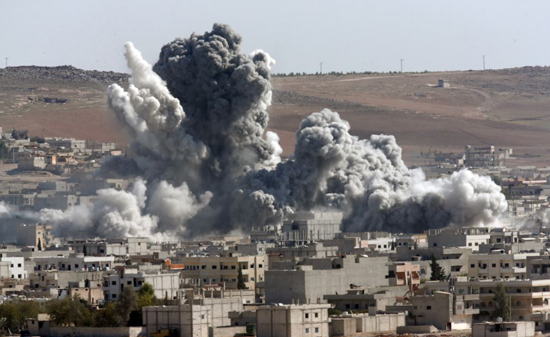
Following the massacre of 38 people – 30 of them British – in the Tunisian city of Sousse on 26 June, Prime Minister David Cameron seized the opportunity to announce plans to expand air-strikes against the Islamic State (IS) into Syria as well as Iraq. This would overturn a 2013 parliamentary vote against British strikes on Syria. Days later, Chancellor George Osborne announced in the Budget that British military spending would increase every year for the next five years. With Labour expected to support the government in a new vote to extend strikes to Syria, it is likely that soon British planes will be bombing yet another country in the Middle East. The lack of any coherent strategy is clear. Bombing IS in Syria will not stop terrorist attacks elsewhere. Continuing to support forces fighting the Syrian government will only strengthen IS. The only sure result of imperialist strategy is continued war in the region for decades, and a continued justification for a huge military budget.
Plans to extend the British military campaign against IS into Syria have been in the making for months. The parliamentary vote to begin strikes on IS in Iraq in September 2014, included a long debate about strikes on Syria. The vote only authorised strikes in Iraq, with many MPs expressing opposition to bombing Syria. On 17 July it was revealed by campaign group Reprieve that British pilots had been participating in air strikes in Syria in exchange programmes with the US and Canadian air forces. This had been specifically agreed by Defence Minister Michael Fallon, in contravention of parliament. The government knew that this would be revealed. A horrific terrorist attack was opportunistically used to propose an urgent necessity to expand the strikes, to limit the damage.
The Labour Party so-called ‘opposition’ has indicated it will support the government in a vote to extend the strikes in Syria, with Shadow Defence Secretary Vernon Coaker stating that Labour: ‘stands ready to work with the government to defeat Isil [IS]’. Of the candidates in the Labour Party leadership election, only Jeremy Corbyn has made clear his opposition to strikes on Syria. Andy Burnham explained: ‘People do look up to this country to play its role and to stand up for people that are at risk of violence and persecution’. A parliamentary vote on the issue is expected after 12 September, when the new Labour leader has been decided,
The Sousse attack was Cameron’s justification for proposing new strikes on IS in Syria. However IS owes its existence to imperialist intervention in the Middle East. The perpetrator at Sousse was gunman Seifeddine Rezgui who was inspired by IS ideology. Rezgui was radicalised in neighbouring Libya. Libya has become the operating base of many jihadist groups since Britain was central to the 2011 destruction of Libya’s state structures. In this imperialist war against the Libyan government of Muammar Gaddafi, Rezgui visited Libya to fight against the government with jihadist militias. These same militias were armed by the imperialists and their Gulf allies and supported by US and British Special Forces. Rezgui returned to Libya in 2014 for further training. Abdul Hakim Belhadj, now commander of IS in Libya, fought alongside the imperialists against Gaddafi.
In Syria, the government of President Assad holds less ground than it ever has. The army and Hezbollah are stretched and exhausted after years of savage fighting – but they are still holding the major populated areas. IS holds around 50% of the country. Significant gains against the government have been recently made by the Southern Front – an alliance of imperialist-moulded ‘moderate’ rebels. They are directed from NATO command centres in Jordan where the US and Britain are supporting efforts to train fighters. According to the Financial Times, Jordan is planning a ‘buffer zone’ (invasion) in southern Syria, which would be run by the Southern Front (29 June). Any weakening of the Syrian government – the only real fighting force which can challenge IS in Syria (beyond the Kurdish north) – will give ground to IS. The recent Iranian nuclear deal may help tip the balance once again against the Southern Front and IS in Syria, and against IS in Iraq. In early July, Iran extended a further $1 billion of credit to Syria.
Britain’s consistent intervention in the Middle East has produced only death, destruction and jihadist terrorism. More bombs being dropped on Syria won’t change this. There is no imperialist strategy to solve the problems of a world in crisis. As their kneejerk, contradictory policies create new problems, kill more people and displace even more, the necessity of resistance to imperialism – and an alternative system – becomes ever clearer.
Toby Harbertson
FRFI 246 August/September2015




